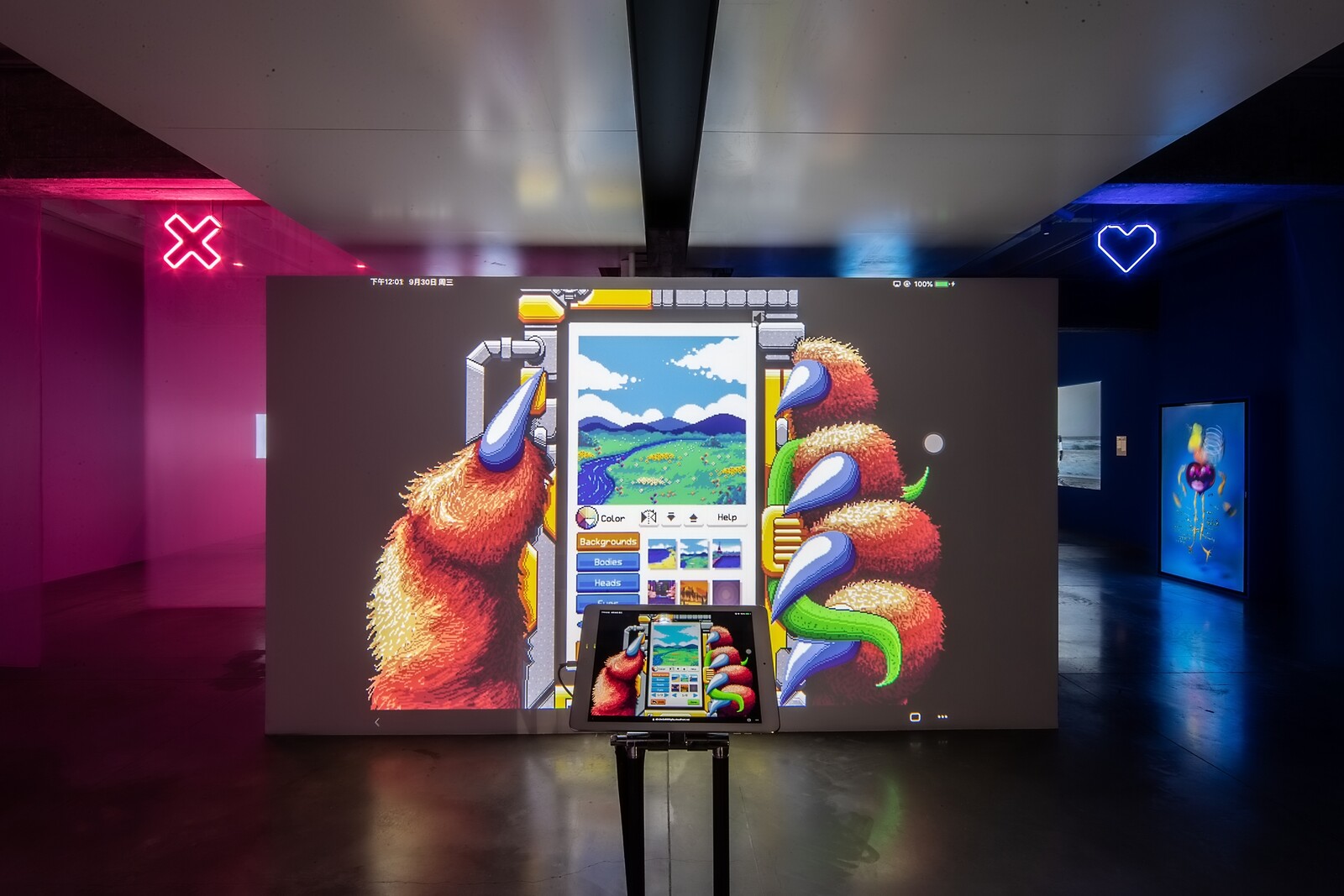AI: Love and Artificial Intelligence
September 30, 2020–January 3, 2021
E-1, 798 Road
798 Art Zone, Jiuxianqiao Road, Chaoyang District
100015 Beijing
China
Hours: Monday–Sunday 10am–7:30pm
T +86 10 5810 1088
The award-winning multimedia exhibition of the 2019 Hyundai Blue Prize—AI: Love and Artificial Intelligence had its grand opening on September 30, 2020 in Hyundai Motorstudio Beijing. This exhibition is curated by Chen Jiaying, who won the “Sustainability” prize in the 2019 Hyundai Blue Prize.
On the exhibition opening day, the curator Jenny Chen Jiaying made an on-site presentation on curatorial concepts, exhibition space planning and more to discuss the disputes and integration of artificial intelligence and love.
AI: Love and Artificial Intelligence is composed of the art works of 13 domestic and foreign artists. Through video installations, three-dimensional animations, mirror tiles, multimedia interactive installations, electronic games and other forms, it focuses on the theme of the competition “social intelligence” and discusses the emotional decisions under the influence of algorithms, love affairs in the online environment, and the physical intimacies in long-distance relationships (Eros); It also resonates the sympathies woven by big data, which gathers people with similar ideologies and excludes those who disagree (Philia).
AI is a pun. It is the pronunciation of “love” in Chinese pinyin, and at the same time, stands for “Artificial Intelligence” in English. The two alphabets express the exhibition’s focus, which is to present the love that this generation has acquired in the age of social networking. It is a metaphor for our manipulated emotions and speaks about romantic online relationships through an intertextual narrative.
The exhibition begins with Monster Match created by American artists Benjamin Berman and Miguel Perez. Inspired by the typical “swipe right to like, swipe left to dislike” mechanism, the whole venue is divided into two spaces of pink and blue, with two different exhibition routes on the left and right. The visitors will select the first exhibit to visit and it determines their route.
Monster Match, a simulation of online dating with monsters, is a stark illustration of the discrimination in dating apps brought by the artificial intelligence recommendation algorithm. An algorithm, called collaborative filtering, counts everyone’s swipes to decide who to show whom. The more popular the content, the higher the probability of being recommended in the list, so this data is generated at the expense of the interests of the minority.
Significant Other is an exhibit that both the left and right routes will pass through. The exhibit consists of two sets of cameras and corresponding display screens. It is an intelligent networked installation. Hanging suspended from the roof, two cameras and flat-screens are positioned back-to-back in a V-shape. The devices are programmed to read and capture “the emotional state” of each figure crossing their pathway. The corresponding screens display the information in the opposite exhibition hall. The pair of dual-screen-and-camera installations capture and display imagery and information shared between two locations.
The postcard project Crying Out Love, in the Center of the Data is not only the key point of the exhibition space, but also the starting point of the public area. This is a postcard project initiated by HE Rongkai and the curator. Faced with the phenomenon that people’s emotions are gradually expressed by “likes” in the current Internet era, the public is invited to pick up the pen to feel the friction between the nib and the postcard, embodying the information as a postcard, letting it drift in the physical posting network, being delivered, and finally bringing the warmth of the greeting.
Although the exhibition is divided into two completely different parts by the game, they are connected to each other through exhibits. People may pass through exhibits such as The Groundless Protag, The Intimacy Package, Love Poem, Blue Hole, or go through Ashley Madison Angels At Work in Beijing, Amber Bog, I hate people but I love you, Column and other exhibits. Through the metaphor of swiping left and right, the audience will therefore follow the limited routes and feel the emotions manipulated by the algorithm.Visitors can re-examine the Internet behavior in the era of big data when walking through the exhibition, explore the algorithmic operation behind each choice, experience the featured artists’ tales through the spectrum of their works, and rethink the emotional and technological circumstances of our time.
“When we are in the era of big data under artificial intelligence, how should we face the increasingly humanized artificial intelligence technologies? Does artificial intelligence really have love?” The ongoing exhibition - AI: Love and Artificial Intelligence at the Hyundai Motorstudio Beijing will last until 3rd of January 2021. Here you may get answers.
Artists: Aaajiao (CN) / Adam Harvey (US) / Benjamin Berman & Miguel Perez (US) / CHEN Zhou (CN) / HE Rongkai (CN) / Johanna Bruckner (AU) / Jonas Lund (SE) / LIU Shiyuan (CN) / !Mediengruppe Bitnik (CH) / Stine Deja (DK) / WANG NewOne (CN) / WANG Yefeng (Frank, CN)
Curator introduction: Jenny Chen Jiaying
Writer and curator. She holds a Bachelor of Arts from the Department of Art History of China Academy of Art and received her Master of Arts degree from Lancaster University in the UK. She is now having a PhD program of Western Philosophy at Eastern China Normal University. She has contributed to media such as Artforum (CN), Artshard and NOWNESS. Recent Projects include: Copernicus, E.M.Bannister Gallery of Rhode Island College, Providence, U.S.A (2019); Li Hanwei: Liquid Health, Goethe Space, Shanghai (2019); First edition of the Shanghai Curators Lab, Shanghai Academy of Fine Arts, Shanghai (2018). Jenny’s other academic activities include the First Annual Conference of Network Society “Forces of Reticulation” roundtable and Huayu Forum of Art, etc. Her article “Post-Internet Art Inside and Outside the Chinternet” was included in the collection of essays Forces of Reticulation published by China Academy of Art Press. Co-writing and editing of Shanghai Contemporary Art Archival Project 1998–2010, was published by MOUSSE in 2017.
The Hyundai Blue Prize prioritizes creativity and sustainability over experience level when evaluating applicants. Each year, emerging Chinese curators submit exhibition proposals based on a theme that reflects Hyundai’s long-term vision. Up to six shortlisted curators will be offered a ‘One-on-One Mentorship’ from junior and senior jury members, who help applicants to prepare their final proposals, make connections within the art world, and explore their full potential.
Hyundai Motorstudios are brand experience spaces that reflect the company’s artistic spirit and experimental approach to art, design and technology. This is where “motor,” a word used in the automobile industry, and “studio,” a word used to describe a space for contemplation and creation, meet in a manner accessible to the public.






